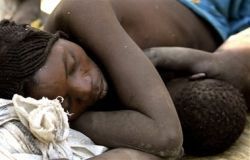Chadians await EU peacekeepers with hope, scepticism
December 15, 2007 (ABOU GOULEM) — Muslim tribesmen in east Chad hope EU peacekeepers will shelter their families from civil war and ethnic conflict, but memories of colonial rule have left them wary of Western meddling in their affairs.
 At Abou Goulem, 60 km (39 miles) from Sudan’s Darfur region, farmer Mahamat indicates where government troops attacked a column of Chadian rebels last month, leaving scores of dead.
At Abou Goulem, 60 km (39 miles) from Sudan’s Darfur region, farmer Mahamat indicates where government troops attacked a column of Chadian rebels last month, leaving scores of dead.
Across a battlefield littered with charred military uniforms and burnt-out pickups, he gestures to the village where stray bullets killed at least three women and set fire to straw huts, burning children alive.
Mahamat says he is hopeful about the 3,700-strong European force which is due to arrive next month and is tasked with protecting civilians, aid workers and refugees in eastern Chad.
“We are not afraid because they will bring peace,” said Mahamat, who refused to give his second name. “We want peace in our country.”
Foreign peacekeepers remain a sensitive issue in Africa because of its colonial past, and even more so in a Muslim country like Chad, which recently started oil production.
The U.S.-led invasion of Iraq sparked suspicion of Western military intervention in Islamic countries and Sudan has insisted U.N. peacekeepers inside Darfur must be African-led.
“We have never seen the whites do anything for free. There are always interests at stake. They just want our oil,” said General Abadi Sayir, prefect of the Chadian border town of Adre.
“We would prefer an African Union force to an EU one. Foreigners do not understand the situation in our country.”
REBELS AT “WAR” WITH FRENCH
Tens of thousands of black Africans have fled raids by Sudanese Arab militia along the frontier, heading deeper into Chad and placing serious strain on the scant water and food resources of the arid region, now home to some 400,000 refugees from Darfur and eastern Chad.
Originally due to be deployed in mid-October, the EU force has been dogged by shortfalls in materials, particularly the helicopters needed to move around eastern Chad.
Irish Foreign Minister Dermot Ahern said on Friday the EU force commander, Irish General Patrick Nash, expected to have European peacekeepers on the ground by mid-January.
The EU force’s mission has been made more complex by the renewal of hostilities last month between Chad’s army and three rebel groups after the collapse of an Oct. 25 peace deal.
The backbone of the EU force will be made up of French soldiers already based in Chad under a bilateral military accord between Paris and its former colony. Rebels have declared a “state of war” against French and foreign forces.
The trial, due to start on Dec. 21, of six French humanitarian workers accused of trying to smuggle 103 children from eastern Chad to Europe has increased wariness among locals towards Europeans.
In Adre, military vehicles trundle through the dusty streets past women in Islamic scarves shopping in the market. Traders complain raids by cattle rustlers from Sudan, usually blamed on the Arab Janjaweed militia, have halted business along the border.
“We have stopped because of lack of security,” said shop owner Adoum. “If the (EU) force doesn’t interfere with our family affairs or with our trade, and it restores security, then we don’t have a problem with it.”
(Reuters)
